-
 Bitcoin
Bitcoin $96,161.2493
-2.14% -
 Ethereum
Ethereum $2,686.5756
-2.45% -
 XRP
XRP $2.5719
-3.67% -
 Tether USDt
Tether USDt $0.9999
-0.04% -
 BNB
BNB $655.8976
-0.15% -
 Solana
Solana $171.9849
-2.65% -
 USDC
USDC $1.0001
0.00% -
 Dogecoin
Dogecoin $0.2435
-4.35% -
 Cardano
Cardano $0.7615
-4.97% -
 TRON
TRON $0.2379
-4.28% -
 Chainlink
Chainlink $17.4447
-5.17% -
 Avalanche
Avalanche $24.9624
-1.92% -
 Sui
Sui $3.3374
-3.85% -
 Stellar
Stellar $0.3266
-3.96% -
 Litecoin
Litecoin $127.2255
-5.17% -
 Toncoin
Toncoin $3.6609
1.73% -
 Shiba Inu
Shiba Inu $0.0...01526
-2.42% -
 UNUS SED LEO
UNUS SED LEO $9.7275
-0.32% -
 Hedera
Hedera $0.2145
-3.18% -
 Hyperliquid
Hyperliquid $24.2706
-2.62% -
 Polkadot
Polkadot $5.0883
0.29% -
 MANTRA
MANTRA $7.6370
0.37% -
 Bitcoin Cash
Bitcoin Cash $317.1514
-3.50% -
 Bitget Token
Bitget Token $5.0005
7.55% -
 Ethena USDe
Ethena USDe $0.9987
-0.10% -
 Dai
Dai $1.0000
-0.01% -
 Uniswap
Uniswap $8.8025
-5.45% -
 Monero
Monero $233.1225
-0.50% -
 NEAR Protocol
NEAR Protocol $3.4727
-2.15% -
 Pepe
Pepe $0.0...09302
-4.88%
What are DeFi's governance tokens?
DeFi governance tokens empower holders to shape platform decisions through voting rights, while offering diverse investment potential driven by platform reputation and market demand.
Feb 18, 2025 at 09:18 pm

Key Points:
- DeFi governance tokens are digital assets that represent ownership in decentralized finance (DeFi) platforms.
- They grant holders voting rights, allowing them to participate in decision-making and shape the direction of the platform.
- The value of DeFi governance tokens is driven by the strength and reputation of the underlying platform, as well as market demand.
- There are various types of DeFi governance tokens, each with its unique characteristics and benefits.
- DeFi governance tokens offer numerous investment opportunities, but they also come with certain risks.
Understanding DeFi Governance Tokens:
- Ownership and Voting Rights: DeFi governance tokens function as a means of ownership within DeFi platforms. Holders of these tokens possess voting rights, enabling them to contribute to key decisions regarding the platform's development, feature implementation, and resource allocation. By participating in governance, token holders have a direct say in shaping the future of the platform.
- Value Assessment: The value of DeFi governance tokens is heavily influenced by several factors. The underlying platform's reputation, track record, and community support play a crucial role. Additionally, the demand for governance tokens within the crypto market, influenced by factors such as speculative interest and investor confidence, affects their value.
- Types of DeFi Governance Tokens: There exists a wide range of DeFi governance tokens, each with distinct characteristics. Some tokens prioritize voting rights, while others offer additional benefits, such as revenue sharing or access to premium features. It is essential to research and understand the specific features and utility of each token before making any investment decisions.
- Investment Opportunities: DeFi governance tokens provide various investment opportunities. By acquiring tokens, investors can potentially benefit from the growth and success of the underlying platform. Active participation in governance can further enhance the potential returns. However, it is crucial to exercise due diligence and be aware of the associated risks before investing in governance tokens.
- Risks Associated with DeFi Governance Tokens: Investing in DeFi governance tokens involves certain risks. The volatility of the cryptocurrency market can lead to fluctuations in token values. Additionally, the success of the underlying platform is not guaranteed, and unforeseen events or technological issues can impact the token's value. As with any investment, it is essential to carefully evaluate the potential risks and consider them in relation to one's financial situation and investment goals.
FAQs on DeFi Governance Tokens:
1. How do I acquire DeFi governance tokens?
DeFi governance tokens are typically available through decentralized exchanges (DEXs). Each platform may have its own mechanisms for token distribution, such as liquidity pools or token swaps.
2. What are the benefits of holding DeFi governance tokens?
Holding DeFi governance tokens grants voting rights, allowing holders to actively participate in decision-making processes related to the platform's development and direction. Additionally, some tokens offer incentives such as revenue sharing or access to exclusive features and services.
3. Are DeFi governance tokens a good investment?
The value of DeFi governance tokens can be volatile, and their performance is dependent on a variety of factors including the underlying platform's success, market demand, and wider economic conditions. It is important to conduct thorough research and understand the potential risks before investing in DeFi governance tokens.
4. How do I evaluate the value of DeFi governance tokens?
When assessing the value of DeFi governance tokens, it is important to consider the reputation and track record of the underlying platform, as well as the platform's current and projected revenue streams. Market demand and investor sentiment can also influence token prices.
5. What are some common risks associated with investing in DeFi governance tokens?
Investing in DeFi governance tokens carries risks such as market volatility, potential platform failure, and regulatory uncertainties. It is crucial to carefully evaluate these risks and invest only what you are willing to lose.
Disclaimer:info@kdj.com
The information provided is not trading advice. kdj.com does not assume any responsibility for any investments made based on the information provided in this article. Cryptocurrencies are highly volatile and it is highly recommended that you invest with caution after thorough research!
If you believe that the content used on this website infringes your copyright, please contact us immediately (info@kdj.com) and we will delete it promptly.
- Tether Launches TradeFi, a Blockchain-Based Financial Service Aimed at Optimizing International Trade
- 2025-02-22 17:00:25
- Altcoin Season Has Begun, Proclaims CryptoQuant CEO Ki Young Ju
- 2025-02-22 17:00:25
- Bybit Hack: Crypto Exchange Loses $1.4B in ETH, Market Cap Drops 1.86% to $3.17 Trillion
- 2025-02-22 17:00:25
- Ethereum (ETH), FTX Token (FTT), Coinbase, stETH, and Blur (BLUR) Are the Top 5 Most Attention-Grabbing Cryptocurrency-Related Keywords
- 2025-02-22 17:00:25
- Bybit Hack: Exchange Loses Over $1.1 Billion in Ethereum in One of the Biggest Security Breaches Ever
- 2025-02-22 17:00:25
- How to Build a Crypto Price Alert System Using CoinGecko and Python
- 2025-02-22 17:00:25
Related knowledge
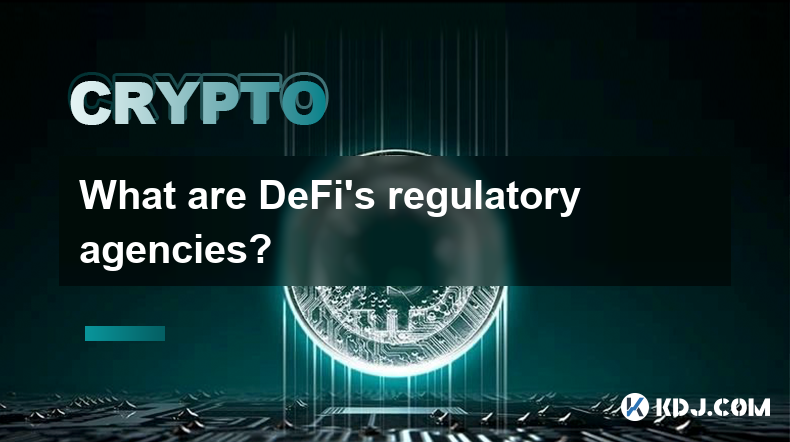
What are DeFi's regulatory agencies?
Feb 16,2025 at 05:18am
Key Points:DeFi: Definition, Architecture, and Regulatory ChallengesRole of Decentralized Autonomous Organizations (DAOs) in Self-RegulationLegal Frameworks for DeFi in the United States and European UnionInternational Cooperation and the Global DeFi Regulatory LandscapeJurisdictional Issues and Considerations for DeFi EntitiesEnforcement Actions and Li...
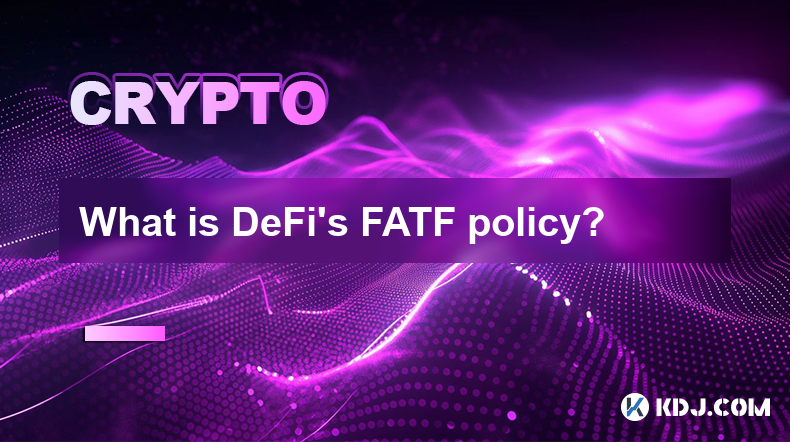
What is DeFi's FATF policy?
Feb 17,2025 at 08:06am
DeFi's FATF Policy: A Comprehensive GuideKey Points:FATF's Definition of Virtual Assets and VASPsFATF's Recommendations for DeFi PlatformsFATF's Travel Rule and its Implementation in DeFiThe Impact of FATF's Policy on DeFi AdoptionFAQs about DeFi's FATF PolicyFATF's Definition of Virtual Assets and VASPsThe Financial Action Task Force (FATF) is an inter...
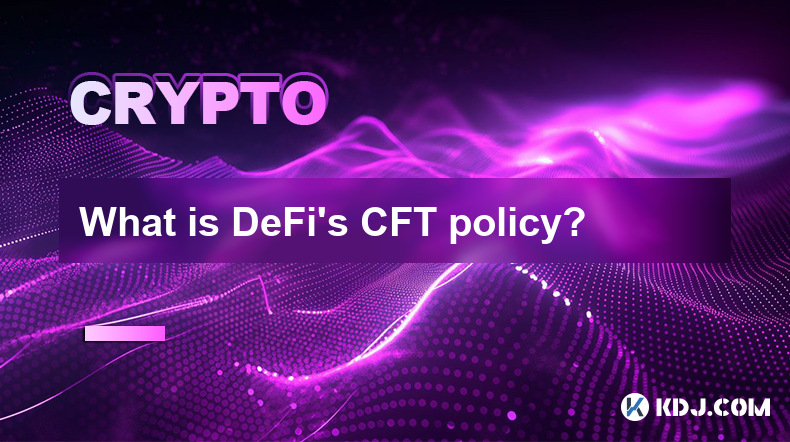
What is DeFi's CFT policy?
Feb 16,2025 at 11:54am
Key Points:Understanding CFT and its Significance in DeFiRegulatory Framework and KYC in DeFiImplementing AML/CFT Measures in DeFiProtocolsRole of Smart Contracts and Blockchain AnalysisChallenges and Future Developments in DeFi's CFT PolicyUnderstanding CFT and its Significance in DeFiCounter-Financing of Terrorism (CFT) is a crucial aspect of the cryp...
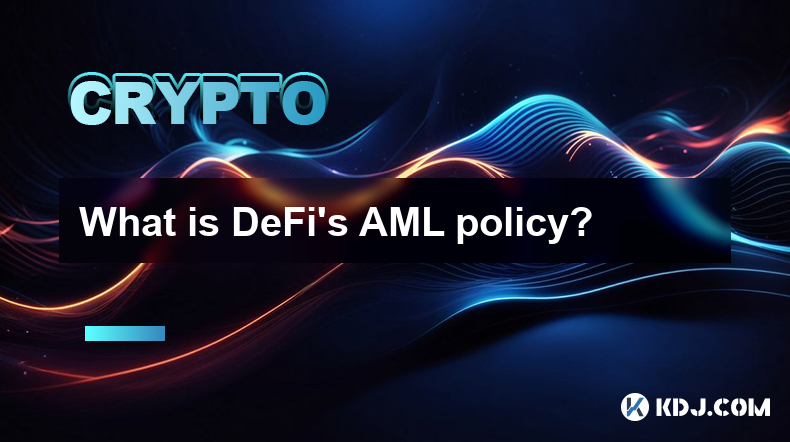
What is DeFi's AML policy?
Feb 15,2025 at 07:48pm
DeFi's AML Policy: Enhancing Compliance in the Crypto EcosystemKey Points:Understanding the Need for AML/CFT Compliance in DeFiChallenges and Limitations of DeFi AML PoliciesDecentralized Identity and Verification SolutionsSmart Contract Optimization for AML EnforcementCollaboration with Regulators and Law EnforcementUnderstanding the Need for AML/CFT C...
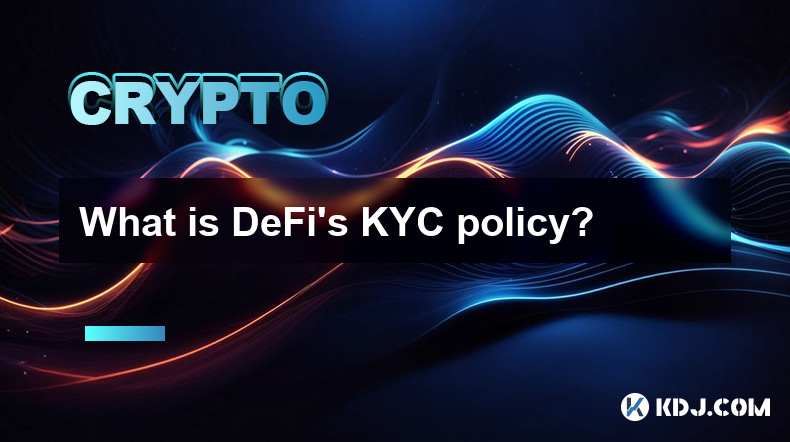
What is DeFi's KYC policy?
Feb 16,2025 at 03:51pm
Key Points:Understanding Decentralized Finance (DeFi)KYC Verification in DeFiBenefits and Drawbacks of KYC in DeFiNotable KYC-Compliant DeFi ProjectsTrends and Future of KYC in DeFiWhat is DeFi's KYC Policy?Decentralized Finance (DeFi) refers to a transformative financial ecosystem that operates on decentralized blockchain networks. Unlike traditional f...
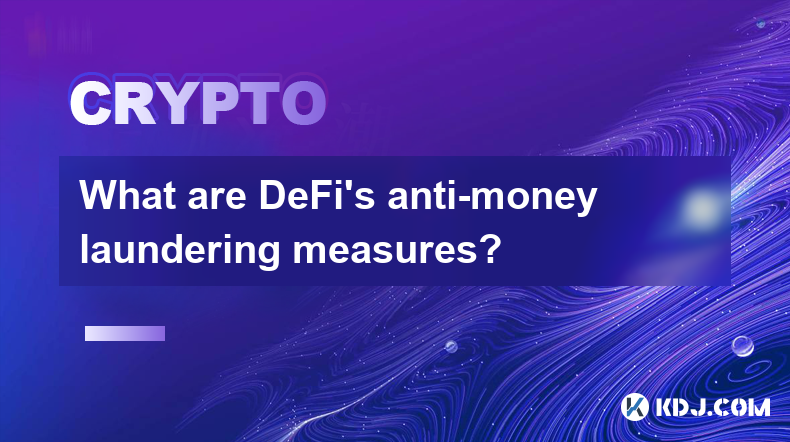
What are DeFi's anti-money laundering measures?
Feb 17,2025 at 07:19pm
Understanding DeFi's Anti-Money Laundering MeasuresKey Points:DeFi platforms utilize decentralized and pseudonymized transactions, posing unique challenges for AML compliance.Regulatory bodies are stepping up efforts to enforce AML regulations within the DeFi space.Various approaches and technologies are employed to combat money laundering in DeFi, incl...

What are DeFi's regulatory agencies?
Feb 16,2025 at 05:18am
Key Points:DeFi: Definition, Architecture, and Regulatory ChallengesRole of Decentralized Autonomous Organizations (DAOs) in Self-RegulationLegal Frameworks for DeFi in the United States and European UnionInternational Cooperation and the Global DeFi Regulatory LandscapeJurisdictional Issues and Considerations for DeFi EntitiesEnforcement Actions and Li...

What is DeFi's FATF policy?
Feb 17,2025 at 08:06am
DeFi's FATF Policy: A Comprehensive GuideKey Points:FATF's Definition of Virtual Assets and VASPsFATF's Recommendations for DeFi PlatformsFATF's Travel Rule and its Implementation in DeFiThe Impact of FATF's Policy on DeFi AdoptionFAQs about DeFi's FATF PolicyFATF's Definition of Virtual Assets and VASPsThe Financial Action Task Force (FATF) is an inter...

What is DeFi's CFT policy?
Feb 16,2025 at 11:54am
Key Points:Understanding CFT and its Significance in DeFiRegulatory Framework and KYC in DeFiImplementing AML/CFT Measures in DeFiProtocolsRole of Smart Contracts and Blockchain AnalysisChallenges and Future Developments in DeFi's CFT PolicyUnderstanding CFT and its Significance in DeFiCounter-Financing of Terrorism (CFT) is a crucial aspect of the cryp...

What is DeFi's AML policy?
Feb 15,2025 at 07:48pm
DeFi's AML Policy: Enhancing Compliance in the Crypto EcosystemKey Points:Understanding the Need for AML/CFT Compliance in DeFiChallenges and Limitations of DeFi AML PoliciesDecentralized Identity and Verification SolutionsSmart Contract Optimization for AML EnforcementCollaboration with Regulators and Law EnforcementUnderstanding the Need for AML/CFT C...

What is DeFi's KYC policy?
Feb 16,2025 at 03:51pm
Key Points:Understanding Decentralized Finance (DeFi)KYC Verification in DeFiBenefits and Drawbacks of KYC in DeFiNotable KYC-Compliant DeFi ProjectsTrends and Future of KYC in DeFiWhat is DeFi's KYC Policy?Decentralized Finance (DeFi) refers to a transformative financial ecosystem that operates on decentralized blockchain networks. Unlike traditional f...

What are DeFi's anti-money laundering measures?
Feb 17,2025 at 07:19pm
Understanding DeFi's Anti-Money Laundering MeasuresKey Points:DeFi platforms utilize decentralized and pseudonymized transactions, posing unique challenges for AML compliance.Regulatory bodies are stepping up efforts to enforce AML regulations within the DeFi space.Various approaches and technologies are employed to combat money laundering in DeFi, incl...
See all articles

















![BONK The Meme Coin MORE THAN ORDINARY [DOG] on Solana BONK The Meme Coin MORE THAN ORDINARY [DOG] on Solana](/uploads/2025/02/22/cryptocurrencies-news/videos/bonk-meme-coin-ordinary-dog-solana/image-1.jpg)


































































